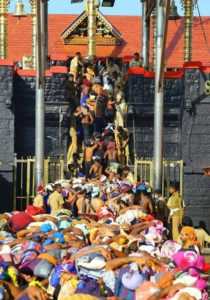Can Menstruation Curtail Women’s Right to Worship?
A growing number of voices question the mindset that bars menstruating women from entering the Sabarimala Temple, which many say infringes on their right to equality.

G
ender equality has been media and government’s darling subject for quite some time. Every week, one or other company gets highlighted for its women-oriented practices. Though the wheels are turning and inching towards gender equality, still a lot needs to be done to defend and safeguard the freedom of women, especially when it comes to the religious sphere.
“One such kind of practice that needs to change is the one in Sabarimala Temple in Kerala. It is the second largest seasonal pilgrimage after the Islamic holy site of Mecca. Despite having such great importance, the shrine is surrounded by few controversies.”
The temple’s website points out that ‘all human beings irrespective of their caste, race or gender are invited to visit the shrine’, however the reality is contradictory. An estimated 40-50 million pilgrims travel to the shrine every year but the females in the age group of 10-50 years are barred from entering the temple.
The temple management makes sure that females post menarche up to menopause are not allowed in the premises of the temple and are not allowed to offer prayers inside the temple because the deity, Lord Ayyappa is considered to be a “celibate” (brahmchari). This practice, followed by relying on ‘outdated’ notions of purity and impurity has raised eyebrows.
Women activists have termed the practice discriminatory while other sections say it has to do with the complex ritualistic practices of ‘sanatana dharma’ of temples in South India. The whole issue came into limelight in the year 1987, when the then Kannada actor, 27-year-old Jayamala, now a Cabinet Minister in Karnataka Government, entered the temple. That particular incident led to huge chaos and took a serious turn raising questions on rights guaranteed by our constitution versus customs which have been prevalent in the society since the beginning of time.
In 2015, protesting against such practices that were ‘sexist’ in nature, outraged women came together to launch #HappyToBleed, a social media campaign on Facebook where they posed with placards; some even made of tampons and sanitary napkins.
“When Temple or Church or any religious authority puts restriction on women and cites religion, it is misuse of religion and deeply patriarchal in nature. Women need to resist it and raise their voices against it.”
Dr. Noorjehan Safia Niaz Co-founder of Bharatiya Muslim Mahila Andolan (BMMA)

Religious authorities make the obvious argument by relying on Article 26 of the Indian Constitution that every religious denomination has the fundamental right to manage religious affairs. They argue that interference by the state in matters ‘wholly’ religious such as temple entry will infringe their rights. They further assert that faith cannot be subjected to the test of logic and reason.
However, slowly, several protests have caught the attention of majority of the community. These protests continue to question whether in the times of gender equality, it is right to forbid the entry of one major part of the society solely on biological reasons.
A lot of hue and cry led to a case being filed in the Kerala High Court in 1991. It was held that the restriction was in accordance with the customs and practices from time immemorial and is not discriminatory as per Rule 3(b) of Kerala Hindu Places of Public Worship (Authorisation of Entry) Rules, 1965 and Article 25 of Constitution which stands for Freedom of Religion.
However, the issue heated up again in 2006 when astrologer P. Unnikrishna Panicker conducted a ‘devaprasnam’ (to discern the will of god or deity) at the temple. Later on, a petition was filed in the Supreme Court by Indian Young Lawyers Association on the grounds of violation of the fundamental rights of women.
“The Fundamental Right is wedded to the concept of equality; it cannot exist in isolation in a water- tight compartment.”
– M.P Jain mentions in his book Indian Constitutional Law
This exclusionary practice which is based upon a biological factor exclusive to the female gender amounts to “discrimination” and thereby violates the very core of Articles 14, 15 and 25.
Dr. Zakia Soman, Member of South Asian Alliance for Poverty Eradication (SAAPE) and founder of Centre for Peace Studies, tells Delhi Post, “The question here is about discrimination of women in the name of religion because God has not differentiated between man and women but it is men who are representing religion.” She further elaborates, “Faith is a feeling of a man and woman and even third gender. Nobody can intervene and decide that whether or not you follow your faith or worship your God. You have no right to deny another individual’s right to practice their faith.”
Article 25 nowhere says that male citizens can discriminate against female citizens; it gives freedom to all individuals. They are trying to get refuge under that article but they cannot get that kind of license to go against women.
“Restricting women of menstruating age from entering into temples is not regarded as an ‘integral’ part of worship as there are other temples which also owe allegiance to ‘sanatana dharma’ but do not ban such women into the temple premises.”
This point was highlighted in the case of ‘Church of Gospel, 2000’ where loudspeakers for use in prayer time were banned owing to environmental concerns stating that only ‘integral practices’ should be treated as a part of religion.
Few questions arise here. If Maharashtra’s Shani Shingnapur Temple could allow the entry of women starting 2016, then what’s stopping Sabarimala Temple? Is spirituality an exclusive domain of men?
The Hon’ble Supreme Court (SC) has questioned the “logic” behind the prohibition of entry of menstruating women and in October 2017, it transferred the case to a constitutional bench. It remains to be seen whether the rights of such women triumph the beliefs of religion.
